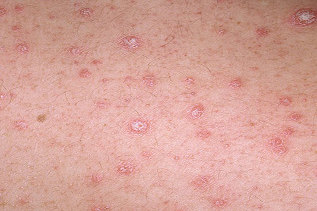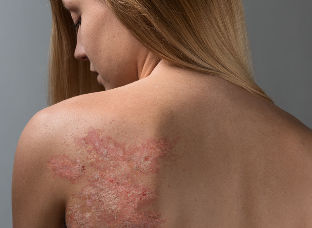
The psoriasis suffer from around 4% of the world population. It can develop at any age, from birth until old age, but the most psoriasis "likes" of young people. This is evidenced by the fact that 70% of patients psoriasis patients under the age of 20 years.
The symptoms of psoriasis: itching, rash, peeling
Who to contact: doctor-dermatologist
Research and analysis: biopsy of skin
Methods of treatment: cryotherapy, PUVA therapy, plasmapheresis
Psoriasis – a chronic non-communicable disease, which usually manifests itself in the form of rashes and peeling of the skin.
The psoriasis suffer from around 4% of the world population. It can develop at any age, from birth until old age, but the most psoriasis "likes" of young people. This is evidenced by the fact that 70% of patients, psoriasis patients, under the age of 20 years.
If the skin appeared skin rashes, resembling psoriasis you should consult a dermatologist. Rashes represent a peel itchy plaques of different sizes. When you do this, the catch plate when the psoriasis can be located on the elbows, knees, scalp or other parts of the body. The doctor can provide an accurate diagnosis and, depending on your way to a treatment.
The causes of psoriasis
Psoriasis is an abnormal reaction of the organism to external stimuli, in which in distinct areas of the body the top layer of the skin wilt much faster than normal. If, in general, the cycle of division and maturation of cells of the skin occurs in 3-4 weeks, when the psoriasis, the process occurs in just 4 or 5 days.
Currently, the psoriasis believe hereditary multifactorialnyh of the disease: the basis of disease is not a, but a complex set of causes immune shifts, metabolic, attendant of endocrinology and neurological disorders. One can say with certainty: the psoriasis not infectious, and, therefore, is not a contagious disease.
The cause of psoriasis is still not completely found. On this point, there are several theories.
According to one of the theories, there are two types of psoriasis:
• Psoriasis type I is called diseases of the inheritance of failures of the immune system. This form of psoriasis suffer around 65% of people, being that the disease manifests at a young age, from 18 to 25 years.• Psoriasis type II manifests in people older than 40 years. With this type of psoriasis is not hereditary and is not related to the faults in the cells of the immune system. In addition, in contrast with psoriasis type I, that you prefer the skin, psoriasis II is the type that most affects the nails and joints.
According to another theory, the cause of psoriasis are solely from the violation of the immunity caused by several factors: it can be stress or infectious diseases, or cold climate, or poor nutrition. For example, it was observed that the alcohol can cause the worsening of psoriasis — this applies especially to beer, champagne, strong alcohol drinks. The use of products that contain vinegar, pepper, chocolate, and also aggravates the course of the disease and can cause exacerbation of psoriasis. According to this theory, psoriasis is a systemic disease. This means that, when serious irregularities in the functioning of the immune system, the process can spread to other organs and tissues, for example, about the joints. The result can develop psoriatricheskii arthritis, which is characterized by a defeat small joints of the hands and feet.
The symptoms of psoriasis

The symptoms of psoriasis are inflamed, peeling patches of red color, accompanied by intense itching. These patches (name tag) often work in the skin of the scalp, knees, and joints of the elbow, in the lower part of the back and in the locations of skin folds . About a quarter of patients affected by nail.
Depending on the seasonality of recurrence (worsening of disease) distinguish three types of psoriasis: winter, summer, uncertain. It occurs more frequently in the winter type of psoriasis.
In the period of exacerbation of the manifestation of psoriasis on the hands, on the lap, on the head, and also in the lower part of the back and in the locations of skin folds act in the form of plates, of a reddish colour. Their dimensions vary from a pinhead to large areas the size of a palm of the hand, and more.
The rash is usually accompanied by the bark and excruciating itching. In the process of peeling of the surface flakes are more dense, localized in depth (hence the second name of psoriasis — flake ringworm). Sometimes, in the field of affected areas of the skin cracks and abscesses.
For the progressive psoriasis characterizes the so-called phenomenon Kebnera: the development of plaques in places of injuries or scratches on the skin.
About a quarter of patients affected by nail. If you have maps of the deepening and stains nails vinyl. In addition, the nails can utolzhatsya and crumble.
During the summer, under the influence of the sun, in the patients of winter, in the form of psoriasis, the symptoms decrease and sometimes disappear. Sick of the summer form of psoriasis, on the contrary, it is recommended to avoid exposure to the sun, as it aggravates the disease.
The diagnosis of psoriasis
Diagnose psoriasis is a dermatologist. It needs to go when eruptions on the skin similar to psoriatic arthritis — plates of different sizes, red, itchy and peeling. To refine the diagnosis may require a biopsy of the skin.
The treatment of psoriasis
If the doctor revealed psoriasis in the initial phase, it is very possible that you will be assigned primarily preventive and not treatment.
When significant manifestations of the disease use the following methods of treatment of psoriasis:
• cryotherapy — a method of cold impact;• plasmapheresis - blood purification;
• therapy by ultraviolet light — the treatment consists in procedures of short duration, similar with the use of the solarium. For a greater effectiveness of the treatment for psoriasis this method is often combined with the acquisition of special medications PUVA therapy).
In any case, do not try to alone involve the treatment of psoriasis ultraviolet without the doctor's recommendation. When the psoriasis is a small dose of ultraviolet radiation are medical, and high — on the contrary, can podhlestnut the development of the disease. The same applies to sunlight baths.
Unfortunately, until now, no one knows how to cure psoriasis completely, because the body preserves the memory" about the disease in the form biochemical, immunological and functional changes. Relapse psoriasis can occur at any time, therefore, patients with this diagnosis should be constantly observed by a dermatologist.























